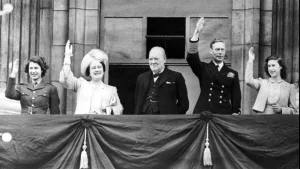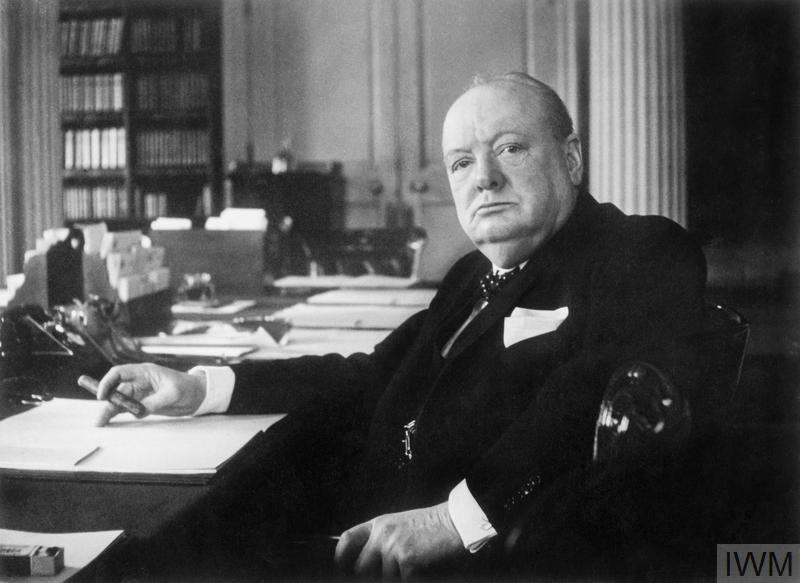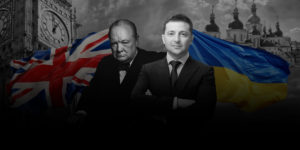
Bulletin #170 — Special 2022
We Shall Fight On

Winston Churchill at his seat in the Cabinet Room at No 10 Downing Street, London. © IWM (MH 26392)
July 26, 2022
How Volodymyr Zelenskyy Channels Churchill
“Courage,” wrote Winston Churchill, is rightly esteemed the first of human qualities because, as has been said, it is the quality which guarantees all others.” Churchill asserted that “men and kings must be judged in the testing moments of their lives.” By these standards, Volodymyr Zelenskyy has been tested and not found wanting. The leadership displayed by the Ukrainian President in 2022 has many parallels with the actions of Churchill in 1940 including defiance, vision, resolution, and communication.
Defiance: On the day Churchill became prime minister in May 1940, the German army launched an assault on western Europe that quickly resulted in the defeat of France and the Low Countries. Britain was isolated. It did not appear to many that there could be any chance of victory, and some counseled making an accommodation with the Nazis that amounted to a kind of defeat. Churchill said, “No!” Despite everything.
Before the Russian invasion began in February of this year, all analysts predicted that the much larger Russian armed forces would easily overwhelm those of Ukraine. But the Ukrainians immediately displayed an unanticipated tenacity. When offered the opportunity by the United States government to be evacuated from his capital city of Kiev, President Zelenskyy responded by saying, “I need ammunition, not a ride.” In standing by his post and his people from the beginning of the crisis, the president has led by example.
Vision: Within a week of becoming prime minister in 1940, Churchill told his son Randolph that he believed Britain could not only survive but achieve victory provided American assistance was forthcoming. Churchill immediately began the process of cultivating the necessary support of President Franklin Roosevelt. It required supreme tact and patience. The process seemed agonizingly slow with the British people fighting for their lives each and every day. Eventually, Congress responded to the president’s request with the Lend-Lease program that helped carry the Allies to victory.

2025 International Churchill Conference
President Zelenskyy now calls for all the aid that the Free World can provide. He too believes his country can prevail. He may well be right. In March, retired Lt. Gen. Ben Hodges, who served as commanding general of US Army Europe, stated his belief that “Russia is not likely to win this war.” His assessment is that Russian forces lack the necessary logistical capabilities to subjugate an overwhelmingly hostile population in a nation as large as Ukraine. The key once again will be the provision of material aid by the United States, Britain, and the other allies.
Resolution: On 4 June 1940, as the situation in France rapidly deteriorated, Churchill delivered one of his most legendary speeches. He told the British people, “…we shall not flag or fail. We shall go on to the end, we shall fight in France, we shall fight on the seas and oceans, we shall fight with growing confidence and growing strength in the air, we shall defend our Island, whatever the cost may be, we shall fight on the beaches, we shall fight on the landing grounds, we shall fight in the fields and in the streets, we shall fight in the hills; we shall never surrender.”
On 8 March of this year, President Zelenskyy became the first ever foreign leader to address Parliament in the chamber of the House of Commons. This he did via a live video link. MPs wore headsets so as to hear a translation of the speech in real time. Describing the scene in the Daily Telegraph, Allison Pearson wrote, “And then came the unforgettable, the unbearably beautiful, heart-cleavingly stirring, almost too-much-to-bear moment. Adapting Winston Churchill’s great speech, Zelensky delivered the immortal ode of British defiance and made it Ukraine’s, ‘We will fight in the sea and in the air, we will fight in forests, fields and on shores, we will fight on the land and in the streets. We will fight on the banks of the different rivers, of Dnieper.’” Seasoned politicians in the House struggled not to lose control of their emotions.
Communication: Within six weeks of taking office in 1940, Churchill had delivered three of his most legendary speeches. First he promised the House of Commons, “victory at all costs.” Next he vowed, “we shall never surrender.” Finally he told the British people that it was their “Finest Hour.” In this way, Churchill successfully communicated his sense of defiance, vision, and resolution to the British people. “Of all the talents bestowed upon men,” a young Churchill had written many years before, “none is so precious as the gift of oratory. He who enjoys it wields a power more durable than that of a great king.”
From the start of the present crisis, President Zelenskyy has communicated with the people of Ukraine through internet media not just daily but several times a day. He includes images that prove he continues to remain at his post in Kiev. He shares with Ukrainians both the good news and the bad. Observers around the world have made comparisons between Zelenskyy and Churchill and concluded that the president has already won the crucial “Battle of Information” in its war with Moscow. Came the hour: came the man.
Subscribe
WANT MORE?
Get the Churchill Bulletin delivered to your inbox once a month.




